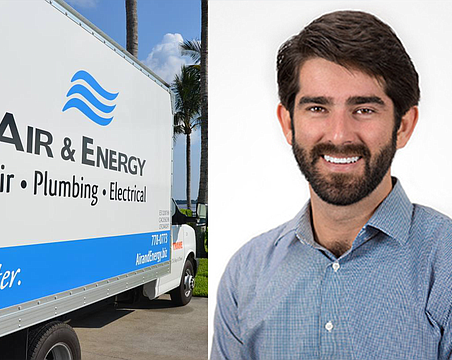Unified Front (Sara/Mana cover)
Gulf Coast chambers of commerce mostly agree on the important issues for the upcoming legislative session: Affordable health insurance, education and transportation.
By David R. Corder
Associate Editor
Tim Clarke looks at California and knows what he doesn't like about Florida politics. The Sarasota advertising and public relations executive counts himself among a throng of businesspeople concerned with what he considers the proliferation of unreasonable and costly constitutional amendments.
Only now the issue has become even more important to Clarke as chairman of the Greater Sarasota Chamber of Commerce. It's also an issue that has galvanized chamber members with other business advocates in advance of the 2004 legislative session.
"There is probably more of a deeper interest this year in statewide issues," Clarke says about the Sarasota chamber. "The most disturbing issue is the growth of the constitutional amendment initiatives. People are very concerned. We see what happened in California, and we're concerned that Florida may be going down that same path."
Such unanimity doesn't come perchance, either, says Paul Ledford, chief lobbyist for the Florida Chamber of Commerce. It's the result of a concerted effort to galvanize the state's local chambers into a single influential voice.
About three years ago, the state chamber introduced the Florida Chamber Federation as part of an overall goal to improve relations between the state and local chambers.
In many states, Ledford says, the state chamber typically feuds with local chambers over key investors - typically the largest, most-influential business leaders. He says the Florida Chamber favors more cooperative ventures with the local chambers and less competition for investors. Now the federation includes as members 118 local chambers throughout the state.
"That's the distribution network for our advocacy programs," says Ledford, the state chamber's senior vice president of public policy. "It's all new within the last three years. It's just starting to gain strength and momentum. And the legislators are starting to connect the dots between the local chambers and the Florida chamber."
Still independent
The effectiveness of the federation also is evident in the legislative priorities adopted this year by other Gulf Coast business advocates such as the Clearwater Regional Chamber of Commerce and the Manatee Chamber of Commerce. Each ranks the constitutional amendment issue among its list of priorities for the 2004 legislative session.
It is certain the Greater Tampa Chamber of Commerce and the St. Petersburg Area Chamber of Commerce will include constitutional amendment reform as an issue when its board meets late next month to adopt 2004 legislative priority lists.
"On some issues, we're definitely the foot soldiers for the Florida Chamber, and will continue to serve in that role," says Tampa lobbyist Mark Flynn, who serves as voluntary chairman of the Tampa chamber's state issues committee.
That's not to mean in any way these local business advocates intend to abandon their independence. For instance, the state chamber ranks constitutional amendments, education and work force training issues and insurance reform as its top three priorities.
At the Sarasota chamber, however, the constitutional amendment issue ranked only fifth on its priority list. Instead, the local chamber membership wants the Legislature to repeal a change last year that allows public high school students to graduate with 18 credits instead of 24. Members think such a variance will have a negative impact on work force development.
Then the Sarasota membership turned its attention to arts funding, a critical component of a healthy Sarasota's tourism industry. Statewide arts funding fell quickly under the budget axe during the prior legislative session.
Cost and availability of health insurance ranked third on the Sarasota chamber's list.
The Sarasota members expressed very little dissent about the ranking or the content of the list, says Clarke, chief executive office of Clarke Advertising & Public Relations Inc. In fact, he formed a definite opinion about this year's ranking process. "It was the unanimous feeling the members who participated had about the platform," he says. "There really wasn't a lot of disagreement or differing views."
At the Manatee chamber, the membership adopted health care and other insurance reforms as top priorities. Constitutional amendments and education issues ranked second and third.
Just as its neighboring business advocates, the Manatee chamber expressed particular dismay at the increasing inability of its small-business members to afford health insurance. Following the state chamber's lead, the local chamber wants the Legislature to abandon policies that place mandates on benefits and providers but instead allow voluntary options on health care coverage.
"I can't remember a time when they were so engaged as they were this year," says Neil Spirtas, the Manatee chamber's vice president of public affairs, about the membership's participation in this year's legislative lobbying effort.
Differences exist
In Pinellas County, the two largest business advocates only partially agree on the legislative issues that affect their memberships the most.
Although currently compiling its priority list, the St. Petersburg chamber apparently leans toward affordable health care insurance as the No. 1 legislative issue. The Clearwater chamber ranks insurance issues as sixth.
"We have the second most mandated coverage of any state in the union," says Russ Sloan, the St. Petersburg Chamber's chief executive officer. "What maybe we want to do is this: If you want to stay with mandated health care coverage, fine; but then have (another) policy with the same coverage but with higher levels of deductible. Maybe what we need is a plan where there is one level that provides basic coverage and link that with catastrophic policy coverage with a higher deductible. The combination of those two may make it more affordable."
On the other hand, Clearwater chamber - with its white beaches and hospitality as its dominant industry - ranks tourism as its No. 1 priority. "Each local geographic area has its own sense of priority," says Ray Ferrara, chief executive officer of ProVise Management Group LLC and the Clearwater chamber's chairman. "One of ours, obviously, is getting money for tourism."
However, the Clearwater and St. Petersburg chambers agree that transportation ranks high on their priority lists. Each chamber thinks the county deserves more state transportation dollars, even though the county has yet to exhaust alternative funding through the local option gasoline tax.
Voters there recently rejected a 3-cent increase in the Pinellas local option gasoline tax. While the Clearwater chamber supported the measure, the St. Petersburg chamber withheld an opinion.
"Pinellas County is in sort of a 'Catch 22,' " Sloan says. "On the one hand, some of the legislators say (the county) hasn't maxed out the gas tax. 'So you can't expect more money if you haven't maxed out the gas tax.' But what they're not considering is the Penney for Pinellas (tax), which funded the Bayside Bridge project. We have voted to help ourselves. I think our Penny for Pinellas road project needs to be viewed in the same light as if we upped the gas tax."
Harm done
Because of the clout it wields, the Tampa chamber doesn't typically release its legislative priority list until the latter part of January each year. Insiders say the practice gives chamber lobbyists more time and opportunities to lobby a larger number of state legislators on critical issues. And in Tampa volume matters.
"Appropriations is still the biggest issue," says Flynn, vice president of governmental affairs in the Tampa office of Hill & Knowlton Inc. "And funding for economic development out of that budget is absolutely vital."
Last year, for instance, the Legislature appropriated $84 million for economic development programs. It appropriated $127 million the year before. "From $127 million to $84 million, that's huge," he says. "That's $40 million. That's a lot of money. We had a market fund program that started just two years ago. It was eliminated."
The budget axe also fell on economic development incentives such as the Qualified Target Industry tax refund program and the Economic Development Transportation Fund.
"Programs like QTI, which the Tampa Chamber uses extensively, were cut," Flynn says. "The transportation outreach program has basically been eliminated. I'm told that money went to fund the classroom size amendment."
But Flynn says the effect of even one-time budget cuts could impede long-term economic development efforts.
"Over the past couple of years, with the economy the way it's been, if anything brings us to the table with a little more anxiety, it's talking about budget issues," Flynn says. "We've all seen in the last couple of years worthwhile programs cut in areas across the board. Optimistically, we're on the upside of the valley so to speak, but some of the programs that have been cut may never recover. It's going to be a long road back."





